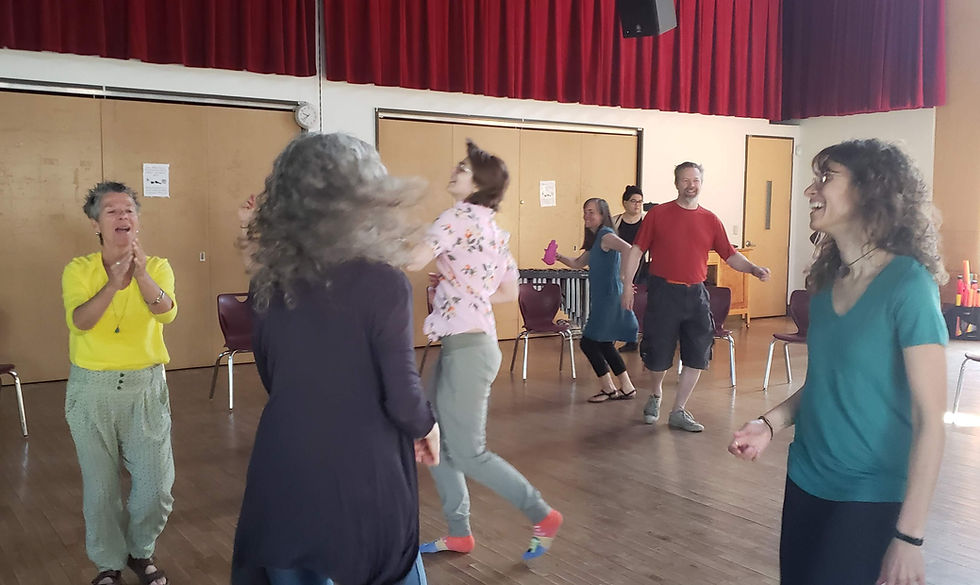Living Music & Cultivating Universal Design for Music Learning
- Irene Feher

- Sep 12, 2025
- 4 min read

We just completed the second week of classes at Concordia University. I am teaching individual voice lessons, Private Study, to a wonderfully varied group of students. Each individual brings with them a rich musical background, fresh ideas and an eagerness to learn. These young people nourish my inspiration, and I am learning a lot of new music thanks to them.
Over many years, Concordia’s music program has been shifting away from a purely Eurocentric Classical Model of music study. Many students arrive with less formal musical training than their peers who studied at Conservatories, took years of private lessons, and participated in high school band/choral programs.
I was one of those students who had little formal musical training. I remember when I started my music studies at Concordia 30 years ago: I had taken piano lessons as a child, singing lessons, and basic piano and guitar lessons as an adult. I was mostly self-taught and mentored by the musicians I played with in bands. Most of my music training was informal and nonformal. Formal training was a huge challenge for me. I remember vividly how difficult it was to write musical dictation, sight read and learn counterpoint. I was interested and super keen to know more, but it took a great deal of effort and countless hours. I can now openly admit that even today, musical dictation instills fear in me. I am coming to understand and accept my limitations, the physical challenges that impede my ability to focus and the speed at which I can process information and write. I am SLOW but I can get the job done.
For as long as I can remember, I have been fascinated by HOW we learn music. I know I am musical. Does being unable to take dictation and sight read on command make me a lesser musician? Absolutely not.
I have come to develop my own ways of learning music. I can read music, but it takes more time to process what I see on the page. Focusing my eyes to read has become even more difficult. I have come to lean on my ear much more - and I think that is a good thing! I am integrating improvisation more in lessons, practice, and play, and it has enriched the way I interpret songs, collaborate with others, and listen to music. I feel more musical, and I am reaching my students more than ever.
This has motivated me to develop my materials. I have started sharing what I do in the teaching studio with educators. Most recently I gave a workshop at Concordia:
Live Your Music - Vocal Improvisation Session & Master Class
Free improvisation as a mindful daily practice can help singers deepen their listening, coordinate breathing, release vocal tension, and connect with embodied musical intuition and vocal individuation.
Without the restrictions imposed by a score or mode, you will be introduced to accessible forms of free improvisation that are not genre specific. As we engage in guided vocal play we are:
Going beyond just singing the right notes at the right time
Listening inwardly and outwardly
Breathing music
Feeling music
Sensing self and other
Letting go of trying to sound good
Tapping into intuition and intention
Finding purpose
Cultivating artistry
The class was attended by a visiting scholar Barrington Coleman from University of Illinois at Urbana School of Music. It was a snowy morning in March, and although only a few students managed to come through the storm, we had an especially inspired experience that had me asking: what if music students, including instrumentalists, could start each day in deep listening, movement and music improvisation? Stepping, singing, playing, dancing, breathing in and discovering the deep process of inner and outer listening that is essential for rich musical expression and collaboration with others.
Playing in music with movement, drumming, and singing connects us with breath and intention. It develops mindfulness and a sense of self in relation to others. Musicians can spend hours alone in a practice room, and I believe they need more chances to connect with each other in non-formal musical play.
Retreats offer rich opportunities for this kind of creative play, I wonder how it can be integrated into music programs.
This may not be an approach that suits everyone. But I know there are different ways that music can be learned. One thing is for sure, mastery is acquired when we put in that ten thousand hours of BEING IN IT AND DOING IT. You have to dive in and play. Being a master of what you can do can bring great fulfillment. Love the process, accept where you are, and be curious about the music that lives inside of you. I am thrilled to be opening pathways to music learning for those whose musical paths were once blocked.
Living Music & Cultivating Universal Design for Music Learning



